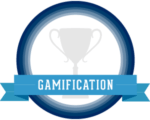Students, parents, and educators can use this website to learn while using activities and games.
Here is a game design resource that is base on the Quest Schools’ model of game-based learning.
Geometric games that are aligned with the common core for K-12.
“In this article, the techniques used and the effects of each are explored and suggestions are provided for instructors considering adding game layers to the classroom.” - Scott Nicholson
Games and Learning provides up-to-date news, blogs, and research on GBL as well as game development and tips on classroom use.
GameUp, as part of BrainPop, provides games that students can play to learn in every subject.
Here students can play games and enter into simulations that teach them civics lessons.
From within a web-browser, the inklewriter will let students make and play interactive stories with no programming required.
The Institute of Play helps to provide information through research about games and their involvement in learning. Here, educators are able to understand how games help students learn and become engaged.
te@chthought provides insight to the fundamental reasons teachers should implement game-based learning into their curriculum.
GamifiED provides a webinar about how to implement game-based learning into the classroom with Alice Keeler who has worked with technology in her doctoral studies research.
"Block by Block" is an innovative partnership between the United Nations Human Settlements Programme (UN-Habitat), the UN agency promoting sustainable towns and cities, and Mojang, the makers of Minecraft.
BLP has a blog series to help teachers master game-based learning, from teaching the jargon to ideas for games.
BrainPOP Jr. provides students and teacher with access to fun and engaging learning games.
What Game-Based Learning Can do for Student Achievement, is an article on edSurge that helps to explain why game based learning is important in the classroom as well as the difference between “gamification” and “game-based learning.”
Educade provides resources for teachers to implement game-based learning in to the classroom and helps them to understand how it can help their students.
edWeb.net hosts game-based learning which provides free professional development for educators who wish to improve upon or learn more about GBL in the classroom.
The Oregon Department of Human Services is working in partnership with ASPIRE to encourage and empower foster youth to gain the knowledge and skills to become self-sufficient, responsible and contributing members of their community.
Resources for youth and adults about foster care in the state of New Mexico.
A resource for Virginia’s foster youth that provides information about education, money management, transportation, legal issues, job training and job opportunities, and staying healthy.















